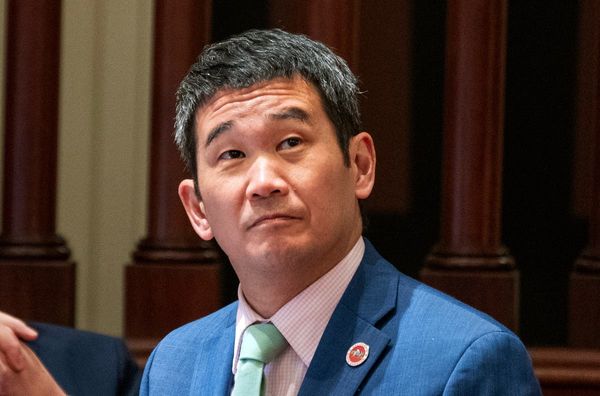
When Joe Biden gave Saudi Arabia’s de facto ruler, Mohammed bin Salman, a fist bump in Jeddah in July, it was viewed as a moment of excruciating realpolitik: Biden, who had vowed to make Saudi Arabia a pariah state over the assassination of the dissident journalist Jamal Khashoggi, was instead palling around with the man believed to have ordered the hit. Today, that gambit appears to have failed – and the relationship is in tatters.
Biden visited Saudi Arabia in the hope of persuading the world’s largest oil producer to increase production and offset petrol costs rising as a result of Russia’s invasion of Ukraine. Instead, last week, Saudi Arabia and its allied oil-producing nations in the Opec+ group – including Russia – agreed to a surprise reduction in supply that will push prices up. The undoubted beneficiary is Vladimir Putin.
In an interview on Monday, Biden threatened unspecified “consequences” for the Opec+ decision – and on Wednesday night, US Democrats told Saudi Arabia that if the kingdom did not change course, they would force a one-year freeze on all arms sales.
Why would Prince Mohammed risk one of Riyadh’s most crucial alliances to help the beleaguered Russian regime – and what will the news mean for oil prices and Russia’s ability to prosecute the war?
How do Opec and Opec+ work?
The Organization of the Petroleum Exporting Countries was founded in 1960, as a way to force oil prices up in response to US import caps and the huge influence of multinational oil and gas companies. Today, there are 13 member states, with Saudi Arabia the most influential. Russia is part of an expanded group of oil exporters, Opec+, which was founded in 2016 as a way to counter big new challenges to Opec’s ability to control the market, from the emergence of the US as a major exporter to the growth of renewable energy.
Economists tend to view Opec and Opec+ as textbook examples of a cartel: member countries agree to coordinate their production of oil in order to influence prices. Opec+ states control about 50% of all crude oil, and 90% of proven reserves; when they slash output, as they did last week, that pushes the cost up.
Why has this decision caused such turmoil?
Opec has been an accepted feature of the marketplace for oil for decades – but the context for this decision is very different. As well as pushing up petrol prices – and by extension inflation – at a time of economic turmoil, the move is of huge benefit to Russia.
After European countries started to reduce their imports, Moscow’s income from oil fell significantly. Crucially, although Opec and Opec+ nominally cut production by 2m barrels a day, Russia was already producing well below its quota, meaning that this decision will allow it to produce more oil for a higher price.
The news has been particularly poorly received in the US, where the likely consequence of rising petrol prices are painful for Biden before crucial midterm elections. It may also be viewed as a humiliation given Biden’s decision this summer to U-turn on his campaign promise to marginalise Prince Mohammed over the death of Khashoggi.
“There was a lot of opposition to that among Democrats – and there was the whole moral dimension, of the war in Yemen and the death of Khashoggi,” says the Guardian’s world affairs editor, Julian Borger. “He expended a lot of political capital to make that trip. Democratic senators feel they have held back considerably to give Biden some latitude on this.”
Even within Opec+, there will be some disquiet, says Dr Neil Quilliam of the Chatham House thinktank. “There will undoubtedly be unease among member states about the strength of the US response, even if members agreed with the market forecasts that led Saudi Arabia to champion this position. Kuwait, for example, which continues to place a very high value on its relationship with the US, will no doubt be unnerved by the current situation.”
What is Saudi Arabia’s relationship with Russia like?
Those who viewed Biden’s trip to Jeddah as doomed from the start might have pointed to a $500m investment by a Saudi firm in Russian oil giants Gazprom, Rosneft and Lukoil at the beginning of the Ukraine conflict – or Riyadh’s decision in the summer to double purchases of Russian oil for its power plants to free up more of its own crude to export.
Meanwhile, the president of close Opec ally the United Arab Emirates, Sheikh Mohammed bin Zayed Al Nahyan, visited Moscow on Tuesday for face-to-face talks with Putin. All of that indicates that Saudi Arabia and its partners have made a decisive shift towards Russia this year.
Partly, that’s a cold economic calculation based on a shared interest in high oil prices. “But it’s also an illiberal alliance,” says Borger. “They see the US and its allies’ pressure for democratic reforms as an insult, and they have come together in the past on social conservatism. They see themselves as representing a hedge against US thinking around the world.”
How will the US and its allies respond?
In his interview on Monday, Biden threatened “consequences” for the squeeze on oil production, without specifying what they might be. Senior Democrats in Congress are demanding radical action which would have a material impact on Saudi Arabia’s economy, and its military strength.
Senator Bob Menendez, chair of the foreign relations committee, said he would vote to block future arms sales, while the New York Times reported that the Senate majority leader, Chuck Schumer, was “seriously considering” legislation that would allow lawsuits for price fixing against the Saudis. And, in this piece, Senator Richard Blumenthal and Representative Ro Khanna call for legislation forcing an immediate halt to all US arms sales, arguing that it would take decades for Riyadh to transition to alternative suppliers and Prince Mohammed would have no choice but to negotiate.
Borger thinks that “this is a bipartisan issue, at least for the time being – Republicans would support this sort of action”. But he points to another possible factor in the Opec+ decision: Prince Mohammed’s calculation that a Trump presidency, and Republican control of Congress, would be beneficial. Through the likely impact on US petrol prices, “they’re putting their thumb on the scale of the US election”, Borger says. “More than a bet on Russia, this is a bet on the Republicans, and especially Trump.”
What happens next?
This is not a “no turning back” moment, says Quilliam: “US-Saudi relations will recover,” partly because the relationship between the two countries is much more deeply embedded in both their institutions. But it is a “hairline fracture”, he adds. “The damage with the Biden administration cannot be repaired, and successive Democratic administrations will likely remember this moment.”
On Tuesday, the Saudi foreign minister insisted that the relationship with the US “has been institutional since it was established” and claimed the Opec+ decision was “purely economic”. On Wednesday night, Saudi Arabia joined an overwhelming UN vote to condemn Russia’s annexation of parts of Ukraine, which was “a way to show they’re still willing to do business”, says Borger.
To assess Saudi Arabia’s likely path forwards, he adds, it’s important to remember that “through every downward turn of the relationship since the death of Khashoggi, Prince Mohammed has shown himself to be defiant. There seems to be this very personal sense that he was not respected.” In this analysis, the Guardian’s Middle East correspondent Martin Chulov argues that his ambition is for Saudi Arabia to “no longer be a Flintstones-like theocracy that eschewed progress and hid behind a US security umbrella … but a wealthy middle power in its own right that chose its friends, on its own terms”.
In the short term, that appears to be good news for Russia, and bad news for the US and its allies. In the longer term, a fractured relationship could be disastrous for Saudi Arabia. “[Prince Mohammed] is not a strategic thinker,” says Borger. “He is the one who got the Saudis into the incredibly costly Yemen war; the killing of Khashoggi shows him lashing out against perceived enemies. If he’s making an economic bet on Russia, it does look at the moment like he’s backing the wrong horse.”







